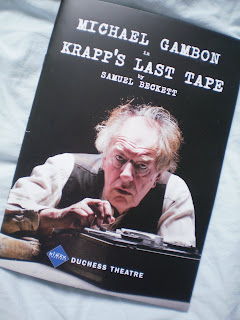
Buying Christmas and birthday presents is made easier for Londoners, I think.
I once found a good present for someone who'd recently bought a small house in France. His hobby was restoring wooden cases such as those found on old clocks. The present was an old box containing a wine thermometer and a scale to show the temperatures at which different French wines should be drunk. I paid £2 in a charity shop for it.

This year I bought a '3D Sudoku', which looked a bit like a giant Rubiks cube, for only 50p. The blocks were held together by magnets. It was still in its clear plastic case and perfect for another friend who's mathematically inclined.
At some stage, though, you have to brace yourself to part with real money,apart from that for the grandchildren, of course, who are easy in that regard. All you have to do is fold their presents in with Xmas cards and wish you'd spent less on yourself over the year (like the laptop I had to buy in August)
It's presents for friends that require some thought, that should suit their hobbies and interests and not be too expensive. The trouble with John Lewis is it's full of overpriced and rather impersonal objects.

That's where specialist museum shops come in. We are so lucky to live in London where there's a museum with its attached mini-emporium, to cater for every taste, from war memorabilia to music, from fans to football. You'd have to visit my home town of Preston for the National Football Museum, but there are museums in London for all kinds of sports, notably tennis at Wimbledon and rugby in Twickenham.
A fellow art-lover gives me a diary from the National Gallery shop every year - it cheers me to open the week-to-view with a Turner seascape opposite. We usually buy presents for a pal who likes sailing at the National Maritime Museum and National Trust Houses in London and elsewhere are great for gardening gifts with a patriotic twist.
We didn't have to scratch our heads for long to choose something for a transport-loving pal who lives on the Sussex coast. I don't mean he's like me and just likes riding about on buses and trains, though he does that, too. I mean he's interested in the history of transportation, particularly steam engines and anything associated with old trains.
The shop attached to the London Transport Museum in Covent Garden exceeded expectations. On two floors, the range of good is huge, from aprons printed with tube maps and sound recordings of trains arriving at mainline stations to pouffes upholstered in the multicoloured moquettes sported by seats in commuter trains. I must say, it's hard to imagine anyone wanting to be reminded of that, though.
You don't have to pay to go into museum shops and cafes. The cafe in the Transport museum is on the first floor, and rather meagrely appointed because so much space is given over to the products for sale. But there's a great view of shoppers below as well as the lights of Covent Garden outside. The shortbread is buttery and crisp, at £2 for a large piece and the same for a pot of tea.
Mostly, though, it has a great collection of books. We found a little volume called 'Disused stations of Sussex' which had lots of black and white photos. Since our friend is a native of those parts, we were sure he'd be delighted -which he was.














































